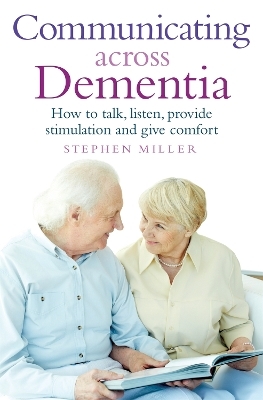
Communicating Across Dementia
How to talk, listen, provide stimulation and give comfort
Seiten
2015
Robinson (Verlag)
978-1-84528-570-8 (ISBN)
Robinson (Verlag)
978-1-84528-570-8 (ISBN)
Information, advice and suggestions for making vital communication easier and more effective.
If someone close to you has dementia (Alzheimer’s Disease is the most common type) you will know that communication gradually becomes more difficult and at times frustrating. This jargon-free book explains why this happens and how you have to rethink your whole approach by:
Making key changes to the way you communicate
Creating the right physical environment for good communication
And bear in mind that communication in the broadest sense goes well beyond talking; there is also a wide range of non-verbal communication such as facial expression, posture and touch.
The person with dementia in your life needs your help. This straightforward book will help you to acquire the knack for improving and facilitating communication that works in a wide variety of situations including:
Improving conversation
Finding stimulating activities
Dealing with challenging situations
Making important decisions
Reducing stress and agitation
Moving into residential care
This book provides invaluable information for people helping to care for people with dementia at home and also those who do so as part of their job.
If someone close to you has dementia (Alzheimer’s Disease is the most common type) you will know that communication gradually becomes more difficult and at times frustrating. This jargon-free book explains why this happens and how you have to rethink your whole approach by:
Making key changes to the way you communicate
Creating the right physical environment for good communication
And bear in mind that communication in the broadest sense goes well beyond talking; there is also a wide range of non-verbal communication such as facial expression, posture and touch.
The person with dementia in your life needs your help. This straightforward book will help you to acquire the knack for improving and facilitating communication that works in a wide variety of situations including:
Improving conversation
Finding stimulating activities
Dealing with challenging situations
Making important decisions
Reducing stress and agitation
Moving into residential care
This book provides invaluable information for people helping to care for people with dementia at home and also those who do so as part of their job.
Stephen Miller is a speech and language therapist with a particular interest in dementia and the ways in which it can affect communication. As a student in the 1970s he worked in hospitals which were home to people with dementia. Even then he was struck by the fact that no effort was made to help patients to express their wishes or feelings or indeed to provide any stimulation for them at all. In the course of his work, happily in far more enlightened times, he worked with families, helping them to find ways of improving communication and reducing stress and frustration all round. He also gave talks to people recently diagnosed with dementia and their carers. In addition he has done voluntary work for Alzheimer Scotland.
| Erscheint lt. Verlag | 7.5.2015 |
|---|---|
| Zusatzinfo | no plate section/illustrations |
| Verlagsort | London |
| Sprache | englisch |
| Maße | 131 x 195 mm |
| Gewicht | 183 g |
| Themenwelt | Sachbuch/Ratgeber ► Gesundheit / Leben / Psychologie ► Krankheiten / Heilverfahren |
| Medizin / Pharmazie ► Medizinische Fachgebiete ► Geriatrie | |
| ISBN-10 | 1-84528-570-0 / 1845285700 |
| ISBN-13 | 978-1-84528-570-8 / 9781845285708 |
| Zustand | Neuware |
| Haben Sie eine Frage zum Produkt? |
Mehr entdecken
aus dem Bereich
aus dem Bereich
wie Frauen mit AD(H)S erfolgreich, selbstbewusst und stabil leben …
Buch | Softcover (2024)
Kösel (Verlag)
18,00 €
ganzheitlich verstehen und behandeln - Ein Ratgeber
Buch | Softcover (2023)
Kohlhammer (Verlag)
28,00 €
Geschichten gegen Angst und Stress
Buch | Softcover (2024)
Hogrefe Verlag
12,95 €


